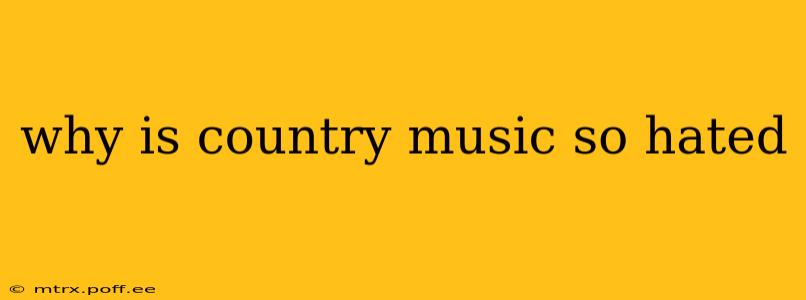Why Is Country Music So Hated? Deconstructing the Genre's Critics
Country music, a genre steeped in tradition and storytelling, often finds itself the target of criticism. While millions adore its heartfelt lyrics and catchy melodies, a significant portion of the population expresses strong dislike. But why? The answer isn't simple, and often boils down to a complex interplay of personal preferences, evolving musical trends, and perceptions of the genre's fanbase. Let's delve into some common criticisms and explore the nuances behind them.
What are the common criticisms of country music?
This is a multifaceted question, with answers varying widely depending on the individual. Some common complaints include:
-
Repetitive themes and lyrical content: Critics often point to a perceived lack of lyrical diversity, with many country songs focusing on similar themes of heartbreak, trucks, drinking, and small-town life. This perceived repetitiveness can lead to feelings of boredom and a sense that the genre lacks innovation.
-
Overly simplistic musical arrangements: Compared to more complex genres like jazz or classical music, some argue that country music arrangements are too straightforward and lack depth. This can be perceived as unsophisticated or even uninspired.
-
Association with a specific demographic: Country music is often associated with a particular demographic – predominantly white, rural, and conservative. This association can alienate listeners who don't identify with that demographic or find its perceived values to be out of sync with their own.
-
The rise of "bro-country": A subgenre that emerged in the 2010s, "bro-country" often faced criticism for its focus on partying, drinking, and pickup trucks, further solidifying negative stereotypes about the genre. While not representative of all country music, its popularity contributed to the negative perception for some.
-
Lack of diversity: While country music is slowly becoming more inclusive, it historically lacked diversity in terms of artists and subject matter. This limited scope contributes to a lack of appeal for those seeking a broader range of perspectives and experiences.
Is country music becoming more diverse?
Yes, the country music landscape is slowly evolving. While it still has a ways to go, there's a growing presence of artists from diverse backgrounds who are expanding the genre's boundaries both lyrically and musically. This growing inclusivity is challenging established stereotypes and broadening the genre's appeal to a wider audience.
Why do people still love country music despite the criticisms?
Despite the criticisms, country music retains a massive and loyal fanbase. This enduring popularity stems from several factors:
-
Emotional resonance: Country music often tackles universal themes of love, loss, and longing in a way that resonates deeply with listeners. The storytelling aspect connects with audiences on an emotional level.
-
Nostalgia and tradition: For many, country music evokes feelings of nostalgia and connects them to their roots or family history. The traditional sounds and instrumentation can be comforting and familiar.
-
Relatability: The often-simple narratives and relatable themes make country music accessible to a broad audience. Many listeners find solace and comfort in the honest portrayal of everyday life.
-
Strong community: The country music community is known for its passionate fans and strong sense of fellowship. This creates a supportive and inclusive environment for those who connect with the genre.
Is the hate for country music justified?
Ultimately, whether or not the dislike of country music is "justified" is a matter of subjective opinion. The criticisms highlighted above are valid points of discussion, reflecting legitimate concerns about genre conventions and representation. However, the enduring popularity of country music demonstrates that its appeal transcends these criticisms for a large segment of the population. The key takeaway is that musical taste is highly personal, and what one person finds offensive or unappealing, another might find comforting and enjoyable.
